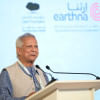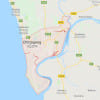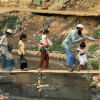Monsoon Worry: UN gears up aid efforts in refugee camps
UNHCR, the UN refugee agency, has said it is rushing additional aid to Bangladesh where the first monsoon rains in Cox's Bazar district affected hundreds of thousands of Rohingya refugees there.
Humanitarian partners estimate that between 150,000 and 200,000 Rohingya refugees will be at risk this monsoon season.
“They are living on land prone to landslides and flooding and are in urgent need of relocation. Of this number, 24,000 people are at critical risk due to severe instability of the land on which their shelters have been constructed,” UNHCR spokesperson Andrej Mahecic said at a press briefing at the Palais des Nations in Geneva yesterday.
He said the first of three scheduled humanitarian airlifts carrying additional shelter materials arrived in Bangladesh on May 1.
Its cargo of 1,400 tents is the first batch of the 10,000 tents that UNHCR will airlift by the end of May. The tents would provide emergency shelter for an estimated 60,000 refugees currently residing in areas at high risk of landslides and flooding.
Aid was also being moved by sea; this included additional tents, 170,000 tarpaulins sheets, and other basic items, he added.
“By the end of May, UNHCR plans to equip all refugee families with shelter kits, which will include bamboo poles, ropes, shelter-grade tarpaulins, sandbags, and tools,” the spokesperson said.
He said UNHCR was also distributing 80,000 pre-monsoon kits and stock-piling 160,000 post-disaster response kits to be distributed to refugees. Another 30,000 post-disaster response kits are to be distributed to affected families of the host communities.
Andrej informed that UNHCR had already positioned five hospital tents and emergency health kits in Cox's Bazar.
Since the August 25, 2017 military crackdown by Myanmar military, more than 700,000 Rohingya refugees have fled to Bangladesh. According to Bangladesh government estimates, the total number of Rohingyas, including the new arrivals, currently living in Bangladesh is over 1.1 million.
In efforts to shelter refugees and meet their basic needs, Bangladesh allocated thousands of acres of land. In addition, the Bangladesh government has recently allocated new land for the refugees.
UNHCR, IOM and WFP engineers are working around the clock to flatten the new land to accommodate those at greatest risk.
“Nonetheless, this work is going more slowly than initially anticipated due to the hilliness and instability of the land. UNHCR hope to relocate some 5,000 people to the new land by the end of May,” said the spokesperson.
In the absence of more available and usable land, UNHCR has made temporary emergency relocation arrangements.
An estimated 35,000 refugees can be hosted by other refugees living in safer areas; 34,000 refugees can be hosted in communal structures in refugee settlements; and 66,000 refugees can be hosted in tents or other emergency shelters within or adjacent to the current settlements.
Meanwhile, in support of Bangladesh's intensive efforts to ready the refugee settlements for the monsoon rains, UNHCR is further strengthening its own emergency preparedness and response capacity.
Refugees themselves are working with the UN agency on the preparedness efforts. Refugee community health workers have completed first aid and cyclone preparedness training. Some have been trained to be in search and rescue teams. UNHCR and partners are working closely with refugees to develop early warning systems and information campaigns for emergency situations.
Six weeks ago (16 March) UNHCR and its partners launched the Joint Response Plan for the Rohingya Humanitarian Crisis seeking more than $950 million in 2018 to meet the immediate needs of more than 880,000 Rohingya refugees and over 330,000 Bangladeshis in communities affected by the crisis. UNHCR's portion of this appeal amounts to more than $180 million.
As of May, only 16 per cent of the needed funds have been received.

 For all latest news, follow The Daily Star's Google News channel.
For all latest news, follow The Daily Star's Google News channel. 








Comments